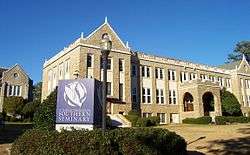Lutheran Theological Southern Seminary
Lutheran Theological Southern Seminary (LTSS) is a theological seminary of the Evangelical Lutheran Church in America (ELCA) and located in Columbia, South Carolina. It offers first and second professional theological degrees. In 2012, it merged with Lenoir-Rhyne University, also affiliated with the ELCA. Although Lenoir-Rhyne is based in Hickory, North Carolina, LTSS operates as a satellite campus in Columbia.[1]
.png) | |
| Type | Seminary |
|---|---|
| Established | 1830 |
| Dean | The Rev. Mary Hinkle Shore, Ph.D. |
Academic staff | 7 |
| Postgraduates | 71 |
| Location | Columbia , 34.0427°N 81.0386°W |
| Campus | 17-acre (6.88 ha) |
| Affiliations | Evangelical Lutheran Church in America |
| Website | www |
History

LTSS was founded in 1830 to help serve the needs of educating pastors for Lutheran Churches in the South. Rev. John Bachman was the first to call for the formation of a seminary, and LTSS owes much of its existence to his impassioned call for a place to educate future pastors. Originally, the campus was located in Pomaria, South Carolina. The first class graduated in 1834 and consisted of one person, Fredrick F. Harris. Harris was not awarded a degree, but was later ordained and thus is considered to be the first "graduate" of the seminary. The first persons on whom a degree was conferred were William Berly, Elijah Hawkins, and P.A. Strobel, all of whom graduated in 1836.
In 1834, the school was relocated to Lexington, South Carolina where it remained from 1834-1856. A surviving building from that period is the Hazelius House.[2] The seminary maintained continuous enrollment until the time of the Civil War, when the entire student body, at this time consisting of exactly three students, left the school to join the Confederate Army. Only one, Jefferson A. Sligh, survived the conflict, and though he never returned to complete his degree, he was eventually ordained by the South Carolina Synod. The seminary was again closed in 1865 due to a lack of students, but was reopened the following year.
In 1868 the seminary was again relocated, this time to Walhalla, South Carolina. The move was temporary as in 1872 the seminary was moved once again to Salem, Virginia, where it would remain until 1884. LTSS was again moved in 1885, this time to Newberry, South Carolina, to the campus of Newberry College, a four-year college sponsored by the South Carolina Synod. In 1903 LTSS was moved to Mt. Pleasant, SC, near Charleston, and was moved once more to Columbia, SC, in 1911 where it remains today. Its first building, Beam Hall, was built on the highest point in Columbia, Seminary Ridge.
In 2005, LTSS began celebrations for its 175th anniversary. Activities have been planned through graduation in 2006 and will include a number of worship services using Lutheran different prayer books that have been in service since the founding of the seminary.
Accreditation
The college was accredited by the Southern Association of Colleges and Schools (SACS) and the Association of Theological Schools in the United States and Canada. Following a two-year review period in which SACS temporarily placed the school on probation review for financial stability, Southern Seminary was removed from the probation in December 2007 and gained full accreditation through the end of their current term in 2013. However, the seminary voluntarily withdrew from accreditation by the SACS, effective 31 December 2008.
Student body
LTSS is a seminary of the Evangelical Lutheran Church in America and consists primarily of students who identify themselves as Lutherans. However, there are also significant populations of United Methodist and Episcopalian students (Rt. Rev. Neil Alexander, former Episcopal Bishop of Atlanta, is actually a 1980 graduate of LTSS). In 2004, in cooperation with the Cooperative Baptist Fellowship, LTSS began a program designed specifically for Baptist students at the seminary. The student enrollment is roughly equal of men and women, and the average age for the junior class is typically around 35.
Academics
LTSS awards four degrees: the Master of Divinity (M.Div.), the Master of Arts in Christian Ministry (M.A.C.M.), the Master of Arts in Religion (M.A.R.), and the Master of Sacred Theology (S.T.M.). In conjunction with the Lutheran Theological Seminary at Philadelphia. The vast majority of students at LTSS are enrolled in a program of study leading to the M.Div. degree as it is required by the ELCA for ordination as a pastor, though a sizable minority of students is also enrolled in the M.A.C.M. program since this degree is acceptable for rostering as a Deacon in the ELCA. Those students enrolled in the S.T.M. program are usually those who already have the M.Div. or M.A. and are seeking to enhance their existing ministerial credentials or prepare themselves for doctoral work in religion.
References
- "United We Stand". Lutheran Theological Southern Seminary. March 26, 2012. Archived from the original on April 15, 2012. Retrieved December 7, 2016.
- "Hazelius House, Lexington County (231 Fox St., Lexington)". National Register Properties in South Carolina. South Carolina Department of Archives and History. Retrieved July 23, 2018.